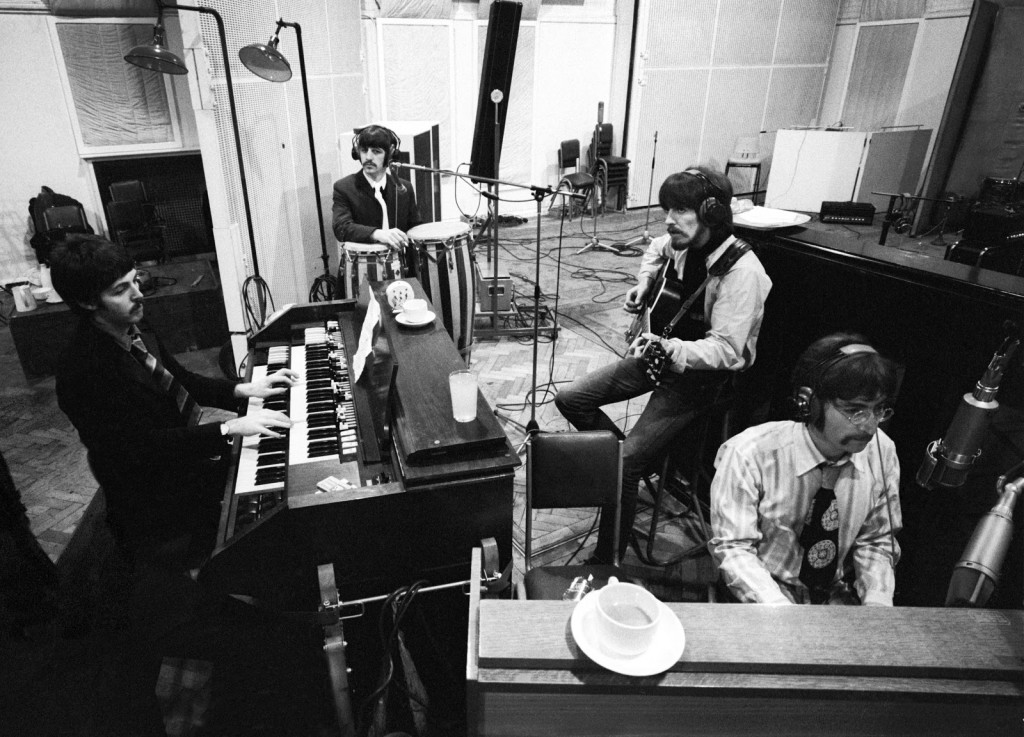Portobello Road
May 21, 1966 - After an all night party Chrissie Shrimpton and Mick Jagger joined John & Cynthia Lennon on an early morning stroll down London’s trendy Portobello Road.
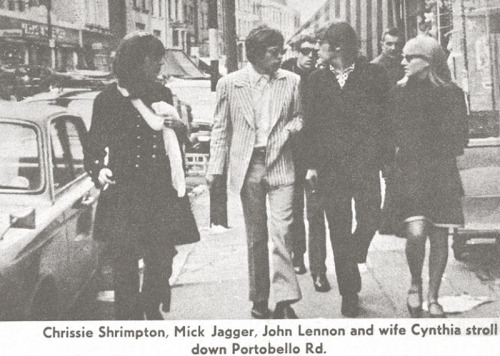
Portobello Road
May 21, 1966 - After an all night party Chrissie Shrimpton and Mick Jagger joined John & Cynthia Lennon on an early morning stroll down London’s trendy Portobello Road.

Following the previous day's shoot inside EMI Studios, The Beatles went on location at Chiswick House in London, to film promotional clips for their forthcoming single Paperback Writer/Rain.
As on the previous day, the director was Michael Lindsay-Hogg, working with a crew supplied by InterTel (VTR Services). Unlike the previous day, which was shot on video tape, this day's footage was captured on 35mm colour film.
Chiswick House is an 18th century house and gardens in west London. For the clip for Rain, The Beatles were filmed outside the gates and around a cedar tree, with the group performing as children played among the branches.
For Paperback Writer the group were filmed inside the conservatory, and miming to the song in the statue garden. Some of the conservatory footage was also used in the Rain clip, and extra shots of The Beatles walking in the grounds were later edited into both films.
Meanwhile back at EMI, working between 11:00 am and 12:30 pm, George Martin prepared the first set of stereo mixes and edits since sessions for Revolver began. Following the production of three monaural mixes for Capitol on May 12th, for its "Yesterday....and Today collection, Martin now made two sets of stereos of the same three songs ("And Your Bird Can Sing", Doctor Robert", and "I'm Only Sleeping").
The color clips were first shown in black-and-white on BBC 1's Top Of The Pops. Paperback Writer had its first screening on June 2, 1966, while Rain had its début on the show on June 9th.
In the evening John and Cynthia Lennon attended a party in London with Mick Jagger and Chrissie Shrimpton.
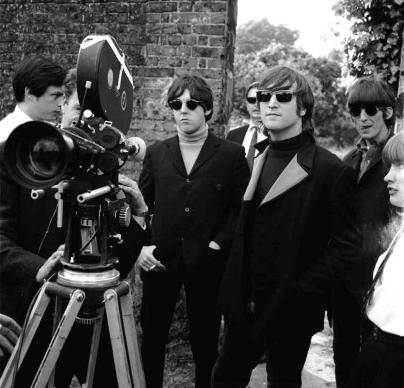
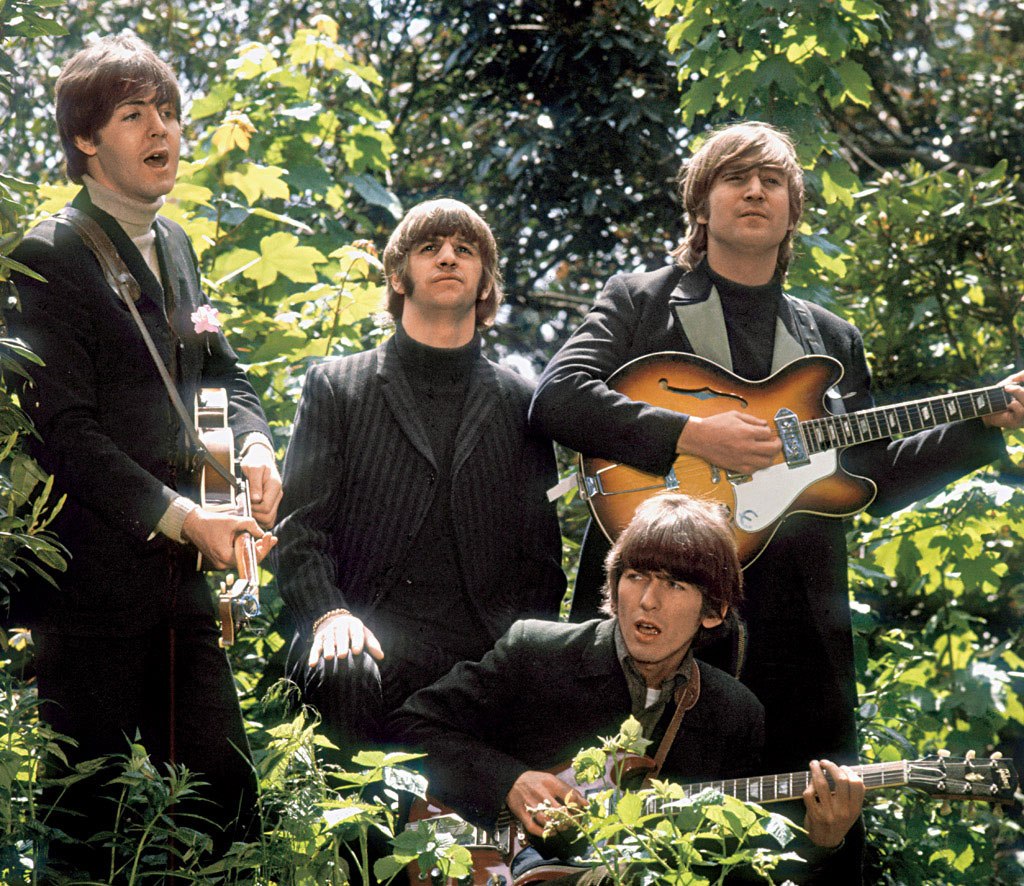
Studio One, EMI Studios, Abbey Road
For the imminent release of the Paperback Writer/Rain single, The Beatles were unwilling to appear on television for promotion. Instead, they took part in a two-day shoot which resulted in a total of seven promotional films for the songs.
This first day's filming took place in Abbey Road's Studio One; the following day they went on location at Chiswick House, London.
The crew was supplied by InterTel (VTR Services), and the director was Michael Lindsay-Hogg. Video tape was used on this first day, while the following day's footage was shot on film.
At 10am a camera rehearsal took place. The first colour performance of Rain was filmed, after which The Beatles watched a playback to see the results. From 1.10-2pm they filmed a colour performance of Paperback Writer.
Both these colour clips were for the US market, and had their première on The Ed Sullivan Show on 5 June 1966, along with a greeting filmed by The Beatles on this day between 6.15pm and 6.30pm.
After lunch The Beatles recorded black-and-white footage for UK viewers, two for Paperback Writer and one for Rain, between 3.30pm and 6.15pm.
The first black-and-white clip of Paperback Writer had its television début on Saturday 25 June in Goodbye Lucky Stars, the final edition of the long-running music show Thank Your Lucky Stars.
The second black-and-white performance of Paperback Writer, along with the one of Rain, were first shown on Ready, Steady, Go! on Friday June 3rd, which was the first time the programme had broadcast footage not from its own studio.
Paul McCartney's song For No One was completed on this day, with the addition of a French horn overdub played by Alan Civil.
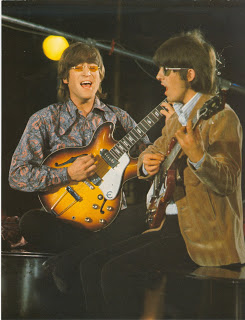
On May 17, 1966, McCartney and John Lennon attended a private listening party for Pet Sounds held at London's Waldorf Hotel.
Studio Two, EMI Studios, London
This 12-hour session, which began at 2.30pm, was devoted entirely to overdubs and mixing for Paul McCartney's "Got To Get You Into My Life".
The Beatles had recorded the rhythm track on April 8, 1966. In the interim McCartney decided to add a brass section, made up of Eddie Thornton, Ian Hamer and Les Condon on trumpet, and Alan Branscombe and Peter Coe on tenor saxophone.The Beatles wanted a definite jazz feel. Paul and George Martin were in charge. There was nothing written down but Paul sat at the piano and showed up what he wanted and we played with the rhythm track in our headphones. I remember that we tried it a few times to get the feel right, and then John Lennon, who was in the control room, suddenly rushed out, stuck his thumb aloft and shouted, 'Got it!' George Harrison got a little bit involved too but Ringo playing draughts in the corner.
With the overdub complete, three reduction mixes were made to create more space on the four-track tape. Previously-recorded vocals were judged to be no longer needed, so they were omitted, leaving only bass guitar, drums and brass. McCartney then added new vocals, accompanied by tambourine and organ. The fourth track was filled with a second lead vocal and an electric guitar part.
At the end of the session two mono mixes were created. The song wasn't complete, however: George Harrison added a guitar solo onto the first vocal track on June 17th, necessitating more mono mixes afterwards.
The Complete Beatles Recording Sessions, Mark Lewisohn
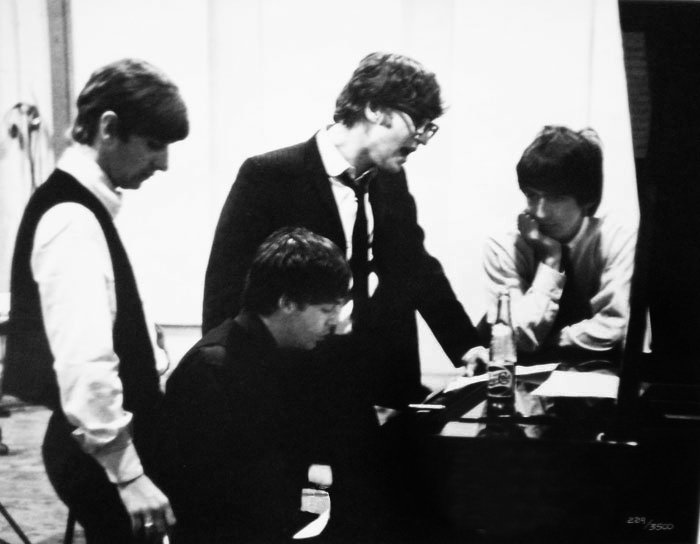
Studio Two, EMI Studios, London
A long day of overdubs, mixing and copying some of the best mixes up to date. "Taxman" received its final ingredient (the "One, two, three, four" into) and was then mixed into mono, and Paul overdubbed his lead vocal onto "For No One".
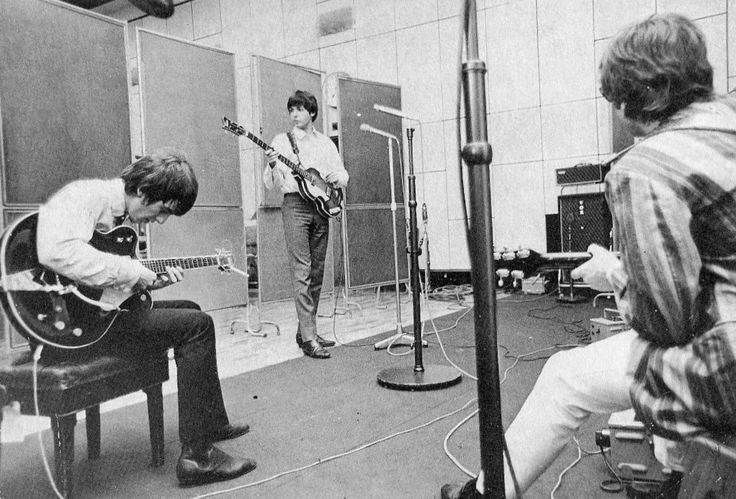
John Lennon and Paul McCartney spoke with Flip Magazine for an exclusive interview that was published in Flip's May 1966 issue. John discusses his opinions of other artists performing Lennon/McCartney songs, while Paul mentions his interest in writing a song about Penny Lane based on inspiration from a song by The Animals.
"If I thought I'd got to go through the rest of my life being pointed and stared at - I'd give up The Beatles now. It's only the thought that one day it will all come to an end and which keeps me going."
That was just one of the frank and controversial comments which came from John Lennon during an exclusive three and a half hour interview I had with him and Paul in the Beatles dressing room at the Birmingham studios prior to the screening of 'The Music Of Lennon and McCartney'.
An hour previously I had been just one of a horde of reporters milling around the press reception hall with a dozen assorted models attired in rubber suits, negligees and bunny outfits (They appear in Peter and Gordon's sequence in the show) before a scale model of the studio set.
Although Paul had not seen me for some months, he singled me out at the reception and courteously invited me back to a private luncheon with himself, Henry Mancini, John and producer Johnny Hamp. During the meal, John expressed some disappointment that certain artists were not able to appear on the show. "You can't expect people to come over at a moments notice but I would have liked big names like Ella, Peggy Lee and Keely Smith to have appeared on the show," said John. "I'm not knocked out with the way Keely Smith did our numbers on her LP but she would have been a great name for the show."
Later in the privacy of their dressing room with only road manager Malcolm Evans, John, Paul, and myself present there were some vigourous views revealed about just who can sing and play Beatle music and do it justice. "There are only about 100 people in the world who understand our music," said John. "George, Ringo, and a few friends around the world. Some of the artists who recorded our numbers have no idea how to interpret them. Keely Smith added nothing to our compositions but a couple trumpets. I loathed Matt Monro's version of 'Yesterday' and liked Marianne Faithfull's. I wanted Richard Anthony on this show but he was busy having car crashes in France or something. We dig the way Esther Phillips sang 'and I Love Him' and Henry's orchestration of 'If I Fell' and that's why they are here. When Paul and I write a song we try and take hold of something we believe in - a truth. We can never communicate 100 per cent of what we feel but if we can convey just a fraction we have achieved something. We try to give people a feeling--they don't have to understand the music if they can just feel the emotion. This is half the reason the fans don't understand but they experience what we are trying to tell them."
"Lack of feeling in an emotional sense is responsible for the way some singers do our songs. They don't understand and are too old to grasp the feeling. Beatles are really the only people who can play Beatle music."
Just what kind of music do the music makers themselves dig? Paul was soon off on what kind of music he likes.
"Dylan is a fantastic composer," said Paul. "At first I didn't understand. I used to lose his songs in the middle but then I realized it didn't matter. You can get hung up on just two words of a Dylan lyric. 'Jealous Monk' or 'magic swirling ship' are examples of the fantastic word combinations he uses. I could never write like that and I envy him. He is a poet."
"I like some of the things the Animals try to do like the song Eric Burdon wrote about places in Newcastle on the flip of one of their hits. I still want to write a song about the places in Liverpool where I was brought up. Places like The Docker's Umbrella which is a long tunnel through which the dockers go to work on Merseyside, and Penny Lane near my old home."
"The one thing I can't understand is the protest songs like 'Eve of Destruction' that was absolute rubbish. Dylan's 'Masters of War' or 'God On Our Side' are OK because they say things in an original manner but P.F Sloan is too much."
John is very conscious of the Beatles musical progression and he explained to me how he would sit down in his house at Weybridge, put all their LPs in chronological order on his stereo gram and study the improving pattern of sound.
"I can hear that we've progressed from this," he used his hand to indicate a level, "To this" and raised it again. "But do y'know I never get to hear them all the way through. Someone always turns up and there I am sitting like an idiot in the front room listening to my own music. I'm too embarassed to leave it on."
At this stage of the interview, things become enlivened by the appearence of our top DJ Jimmy Savilla (who just happened to be around) who sat down on a chair opposite. Jim, who has blonde shoulder length hair, was wearing blue denims embossed with an enormous silver buckle and white leather boots. An imposing sight!
"Something's wrong with you," smiled John. "You're not smoking." Jimmy explained that George had recently complained about his self-made smog in the Beatles dressing room.
"That was George," declared John, and Jim promptly lit up an enormous cigar and disappeared behind his smoke screen. Recording manager George Martin entered upon the scene and for some reason that escapes me began in true life confessions manner to tell us about his Uncle who was a crook.
"I had an uncle who looked after sheep," said Paul. "He was a shepherd's crook." This pun was greeted with a short but reverent silence which was finally broken by Malcolm who declared piously, "Dat's very funny (significant pause)...boss!"
The inevitable subject of Elvis Presley was brought up by Jimmy who is his most ardent fan, and declared on a trip to Moscow recently the 10 by 8 glossies which he took with him of Elvis were like gold dust over there.
"We saw enough of him on our last trip to realize that he is anything but stupid," declared John. "I asked him if he had any new ideas for his films and he and Colonel Tom explained that the only time that they had departed from the 'kinda cowboy meets cowgirl theme' that they lost money. There's only one thing wrong with Elvis," said John. "He's a bit square that's all."
I tackled John about the subject of the Liverpool Cavern Club which was in danger of being closed down. It was this club where the Beatles blasted off from to International fame.
"Someone came up to me the other day and asked what I had done to save the club that made us," retorted John. "I replied that we made the club - the club did not make us." John later revealed that he is working on his next book. "I just sit down in the morning and work right through the day without a stop," said John. "Food just appears in front of me and I eat it - time means nothing to me while I'm working."
"Someone sent a copy of my book "Spainiard in the Works" back to me the other day. They complained I used bad language in the book. I returned the book to the agents with instructions to re-sell it.
We've often heard from reporters what they thought about The Beatles, but I'd never seen written what the Beatles thought about reporters. I asked John for his views.
"You can spot the good ones even in a crowded reception hall," said John. "You'll be saying something which no one else is writing down but just one or two reporters. I've seen enough journalists to recognize those who know what we're all about."
"Better tell him he's in' or you'll hurt his feelings," added Paul nodding at me.
"He wouldn't be here if he wasn't," retorted John.
Other subjects covered during the course of the afternoon comprised of Marxism, Royality, Hairdressers, Eastern Philosophy, Cars, Clothes and why John was wearing a T-Shirt labelled 'Lord John'.
The question of the musical which J and P want to write arose as I was about to leave. Paul commented sadly upon the scheme.
"I think we are resigned to the fact that this can not come about until The Beatles are disbanded. Then and only then will we have time to work on compositions."
When will The Beatles retire as a group? It could be next week because with this group the unexpected is always to be expected.
Source: Original magazine issue (Flip)
The Beatles are not at the studio today, but will be back later in the week.
The Beatles in-between recording at EMI Studios in London
Studio Three, EMI Studios, London
By making Help! a seven-song Beatles album and reducing Rubber Soul to 12 songs (two of those refugees from the British Help! LP) Capitol Records had, by 1966, almost enough material to compile a new album of songs unissued in the US to that time. There were eight available, three more would be ideal, so an application was made for three of the new Revolver recordings to be sent across for release a few months earlier than planned. The answer was positive and mono mixes and edits made this day of "Doctor Robert", "I'm Only Sleeping" and "And Your Bird Can Sing", were done for just a purpose.
Yesterday....And Today was issued by Capitol on Monday, June 20th, but these three songs were later mixed again for the British Revolver LP, causing some slight differences between the two sets.
